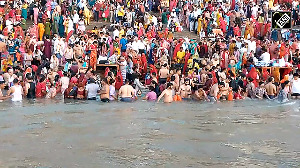 A crack team of about 70 commandos from 21 Para of the Indian Army carried out the surgical strike inside Myanmar territory in the thick of the night that killed 38 insurgents belonging to NSCN(K) and KYKL militant groups on Tuesday.
A crack team of about 70 commandos from 21 Para of the Indian Army carried out the surgical strike inside Myanmar territory in the thick of the night that killed 38 insurgents belonging to NSCN(K) and KYKL militant groups on Tuesday.
The commandos, equipped with assault rifles, rocket launchers, grenades and night vision goggles, were divided into two groups after they slithered down from Dhruv helicopters just inside the Indian territory near the border with Myanmar.
Once divided, the commandos of the Army's special forces headed for two camps being run by NSCN(K) and KYKL, believed to be responsible for the deadly ambush on June 4 which killed 18 soldiers and wounded 11 others.
The teams trekked through the thick jungles for at least five kilometres before they reached the training camps.
"Each of the two teams were further divided into two sub-groups. While one was responsible for the direct assault, the second formed an outer ring to prevent any of insurgents from running and escaping," security sources said.
The actual operation (hitting the camp and destroying it) took about 40 minutes. Not only did the commandos kill those present at the camps in gun fight, during which rocket launchers were also used, one of the camp was also set afire.
Sources said thermal imagery was also used to track the operation.
They maintained that the Myanmarese authorities were kept in the loop.
Mi-17 helicopters of the Indian Air Force were put on standby, ready to be pressed into service to evacuate the commandos in case anything went wrong.
"The operation was carried out based on specific and very accurate intelligence" and the operation was overseen by General Officer Commanding (GoC) of the Dimapur-based 3 Corps Lt Gen Bipin Rawat, the sources said.
Army chief Gen Dalbir Singh Suhag, who had postponed his trip to UK for the operation, was coordinating from the Army headquarters.
The decision to go in for a hot pursuit was taken just hours after the ambush on June 4 in a meeting that was chaired by Home Minister Rajnath Singh and attended by Defence Minister Manohar Parrikar, National Security Advisor Ajit Doval, Suhag and others.
Sources said that the Army will undertake more such operations in the region if required.
At the June 4 meeting, it was initially suggested that the attack on militants camp should be carried out the very next day, the sources said but the Army Chief expressed his inability to carry out the strike at such a short notice.
However, it was decided that the strike has to be executed as early as possible since a "hot-pursuit" normally is carried out within 72 hours of an incident by militants.
Then, the top security establishment decided that the attack would be carried out on Monday and General Suhag was asked to make all the preparations.
Prime Minister Narendra Modi was briefed about the decision, the sources said.
The meeting explored the options of air strike using Sukhoi and MiG-29 fighters as well as ground strike by special forces of the army.
However, this option was ruled out since the possibility of collateral damage was high in an air strike.
To finetune the operation, Doval dropped out of the prime minister's two-day tour of Bangladesh on June 6 and 7.
When the attack was finalised, the prime minister was in Bangladesh and there was a necessity to brief him all aspects of the operation, sources said, adding, so, the strike was again delayed by a day and finalised for early Tuesday morning.
Meanwhile, the army chief undertook a visit to Manipur.
The prime minister was briefed about the operation after his arrival from Bangladesh on Sunday night and got his final clearance.






 © 2025
© 2025